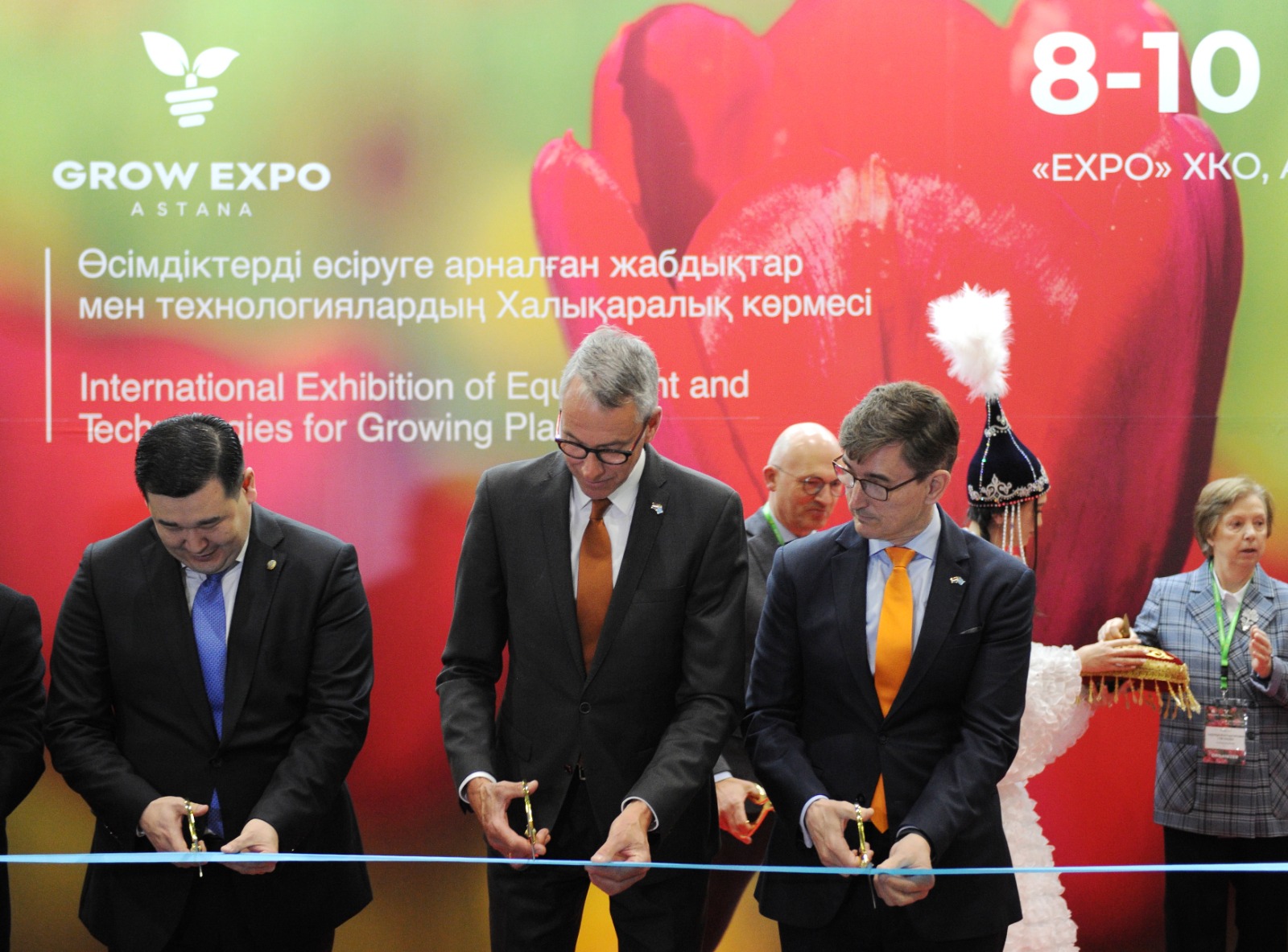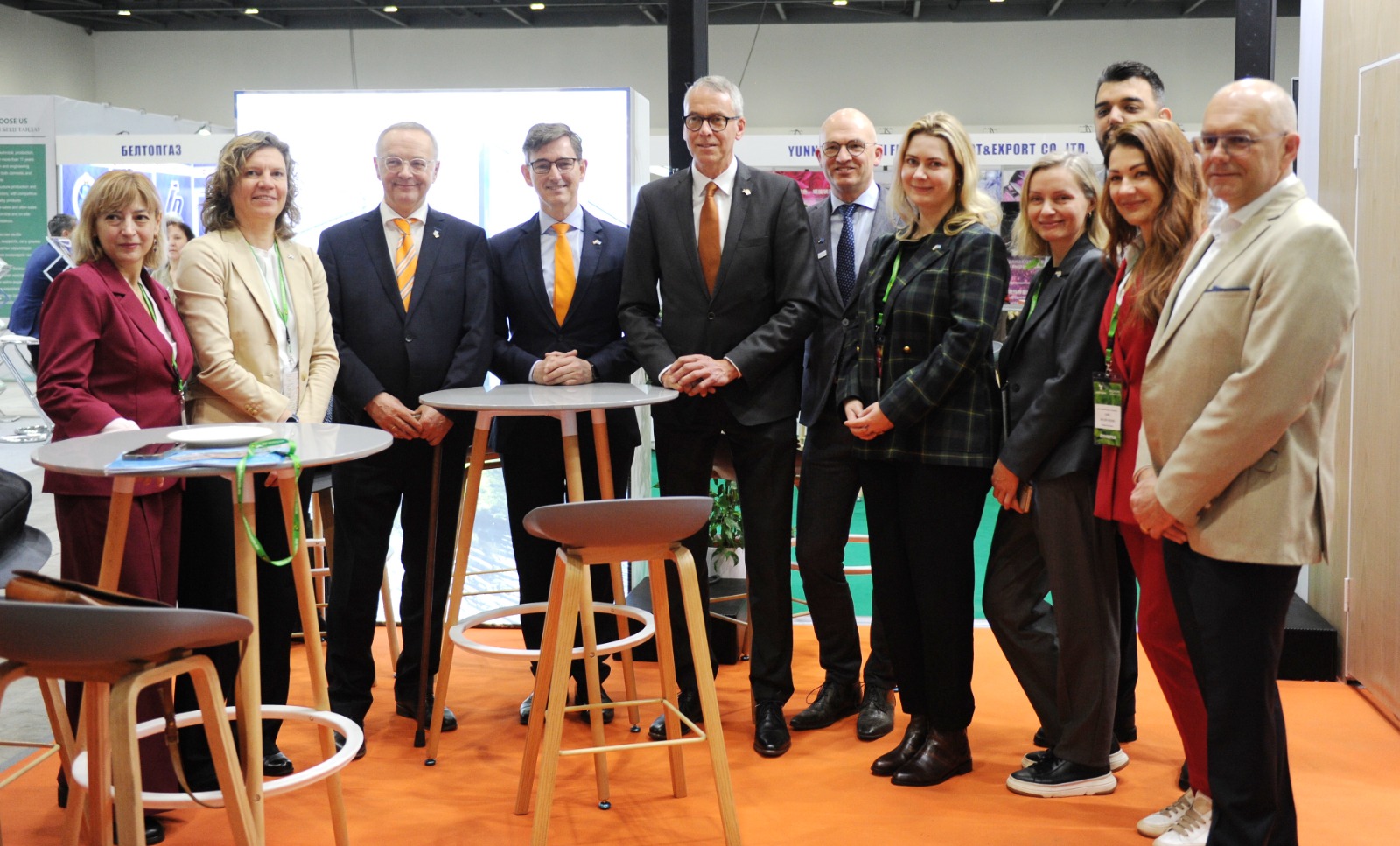ASTANA – More than 40 Netherlands companies took part in the Grow Expo and Flora exhibition in the Kazakh capital on April 8-10 displaying the advanced horticultural solutions. The Astana Times spoke with Jan-Kees Goet, the Secretary General for Agriculture, Fisheries, Food Security, and Nature about the joint projects with Kazakhstan and Netherlands’ leadership in sustainable and efficient horticulture.

Jan-Kees Goet, the Secretary General for Agriculture, Fisheries, Food Security, and Nature . Photo credit: magazines.rijksoverheid.nl
Agriculture is the second-largest sector of Kazakh-Dutch cooperation. In your opinion, what makes Kazakhstan an attractive partner for the Netherlands in this field?
Kazakhstan and the Netherlands share a strong foundation for agricultural cooperation, built on complementary strengths and mutual interests. With vast agricultural land, rich natural resources, and a rapidly developing agribusiness sector, Kazakhstan offers significant opportunities for collaboration. The country is modernizing its agricultural industry, focusing on innovation, sustainability, and increased productivity.
At the same time, the Netherlands brings expertise in high-tech agriculture, horticulture, and sustainable food production, creating a strong basis for knowledge exchange and joint projects. Kazakhstan’s strategic location between Europe and Asia further enhances its role in regional food security and international trade. Kazakhstan-Netherlands cooperation can result in advanced agricultural efficiency, application of innovative solutions and strengthening Kazakhstan’s position in global markets.
What are some of the most promising Netherlands-Kazakh projects in the agricultural sector and how can Kazakhstan benefit from them?
The Netherlands and Kazakhstan share a longstanding agricultural partnership built on collaboration and knowledge exchange across key sectors such as poultry farming, greenhouse technology, and dairy production. By working together, our countries contribute to greater efficiency, sustainability, and resilience in Kazakhstan’s agrifood industry.
Advancements in greenhouse technology are supporting year-round vegetable production, reducing dependence on imports, and promoting resource-efficient practices. In poultry farming, innovative breeding techniques, automated systems, and sustainable approaches help improve animal welfare and productivity while addressing environmental considerations. The dairy sector is also evolving with the adoption of advanced robotics technologies that enhance efficiency and modernization.
These joint efforts strengthen agricultural productivity, support food security, and contribute to the long-term sustainability and competitiveness of Kazakhstan’s agrifood sector.
In 2023, Kazakhstan and the Netherlands signed a memorandum of understanding and established a joint agricultural committee. What are the key priorities for this committee in the coming years?
In 2023, Kazakhstan and the Netherlands signed a memorandum of understanding and established the Kazakhstan-Netherlands Agricultural Working Group, which serves as a platform for deeper cooperation, continuous dialogue, and the exchange of technology and knowledge.

Jan-Kees Goet at the opening ceremony of Grow Expo Astana, an international exhibition focused on equipment and technologies for plant cultivation. The event highlights global cooperation in the field of agriculture and innovation. Photo credit: Grow Expo
Our key priorities include horticulture, breeder’s rights, animal welfare, and agricultural education, with a focus on facilitating mutual trade and investment. Every time our working group meets, we uncover new areas for potential collaboration.
For example, this year, a parallel mission of agricultural education representatives from the Netherlands will take place alongside the working group’s activities. The Dutch delegation includes renowned institutions of applied agricultural sciences such as Aeres, Lentiz, and HAS green academy, and is led by GroenPact, a Dutch organization focused on strengthening international partnerships in agriculture. We are hopeful that this mission will foster new partnerships and initiatives between our countries.
High-tech greenhouses are among the most in-demand Dutch solutions in Kazakhstan. What innovations from the Netherlands can help improve productivity and sustainability in Kazakhstan’s greenhouse sector?
The Netherlands is at the forefront of greenhouse technology, offering several innovations that can boost productivity and sustainability in Kazakhstan.
Dutch climate-controlled greenhouses use automation and LED lighting to boost plant growth and extend growing seasons.
Water-efficient irrigation systems, like drip systems, help conserve water and improve efficiency, which is crucial for Kazakhstan’s dry climate. Integrating renewable energy sources, such as solar and geothermal, reduces energy costs and makes greenhouses more sustainable.
Additionally, AI-driven monitoring with smart sensors optimizes temperature, humidity, and soil conditions, enhancing greenhouse performance.
By adopting these innovations, Kazakhstan can increase domestic food production, improve sustainability, and reduce reliance on imports.
The Netherlands is a world leader in precision farming and agri-tech. What lessons can Kazakhstan learn from Dutch advancements in agricultural automation and robotization?
The Netherlands advanced in agricultural automation and robotization due to a combination of factors. With limited land and a high population density, Dutch farmers have embraced technology to maximize productivity and optimize land use.
The government has strongly supported innovation through funding, incentives, and policies, while institutions like Wageningen University foster research and collaboration with private companies to develop cutting-edge agri-tech.

More than 40 Netherlands companies took part in the Grow Expo and Flora exhibition in the Kazakh capital on April 8-10 . Photo credit: Grow Expo
Our focus on sustainability and efficiency has further driven adoption, with automation reducing environmental impacts and increasing resource efficiency.
As one of the world’s largest agricultural exporters, the Netherlands leverages automation to remain globally competitive. This collaborative approach between tech firms and farmers has created a dynamic ecosystem for agricultural innovation, making automation and robotics essential for the success of Dutch agriculture.
Climate change poses challenges to agriculture worldwide. How can Dutch climate-smart solutions help Kazakhstan adapt to changing conditions and ensure sustainable food production?
Climate change is a global challenge, and I am proud to highlight the strong cooperation between Kazakhstan and the Netherlands in addressing this issue, particularly within the frameworks of the Conference of the Parties (COP) and the Food and Agriculture Organization (FAO).
Kazakhstan serves as a pilot country for the Convergence Initiative, where we collaborate on climate-smart agriculture and sustainable practices. This initiative focuses on integrating innovative technologies and solutions to improve resilience to climate change.
In terms of specific technologies, several Dutch innovations could be beneficial for Kazakhstan’s agricultural sector in facing climate change consequences.
Drought-resistant crop varieties, developed by Dutch researchers, are tailored to Kazakhstan’s climate, enhancing resilience to heat and drought.
Water-efficient irrigation systems, such as precision drip irrigation and water recycling technologies, help optimize water use while maintaining productivity.
Regenerative agriculture practices, including soil conservation, no-till farming, and organic composting, contribute to preserving soil fertility and combating desertification.
Additionally, smart weather prediction tools, powered by AI, enable farmers to better prepare for extreme weather conditions like droughts and frost, improving overall agricultural sustainability.
Given the challenging geopolitical landscape and disruptions in global supply chains, Kazakhstan is poised to play a key role in strengthening food security across Central Asia and beyond. What potential obstacles or challenges could hinder this effort?
Kazakhstan has great potential to become a key agricultural hub due to its geographical locations and prioritisation of development of the agricultural sector.
Global experience shows that achieving food security requires prioritization of factors such as infrastructure development, investment in modern technologies, and sustainable agricultural practices.
The Netherlands focus on precision farming, automation, and water-efficient systems has been crucial in improving productivity and sustainability.
Additionally, effective policies and incentives for innovation are vital to this ambition.
A skilled workforce, supported by agricultural education and training, ensures the adoption of best practices, while financial support, like loans and insurance, helps mitigate risks.
Kazakhstan offers favorable conditions for agricultural investment, including government incentives like reimbursing up to 25% of dairy farm construction costs. What additional measures could further attract Dutch agribusiness investments?
Kazakhstan has already created a strong foundation for agricultural investment with its favorable conditions and government incentives. Further enhancing collaboration between the Dutch and Kazakh governments, improving access to advanced technologies, and exploring additional support for innovation in sustainable practices could provide even more opportunities for Dutch agribusinesses to contribute to Kazakhstan’s agricultural development.
According to the Kazakh Ministry of Foreign Affairs, the Netherlands is one of the top five trading partners of Kazakhstan in the EU. In 2023, bilateral trade was $4.4 billion (exports – $4 billion, imports – $400 million). Since 2005, FDI from the Netherlands to Kazakhstan has been approximately $117.7 billion.
